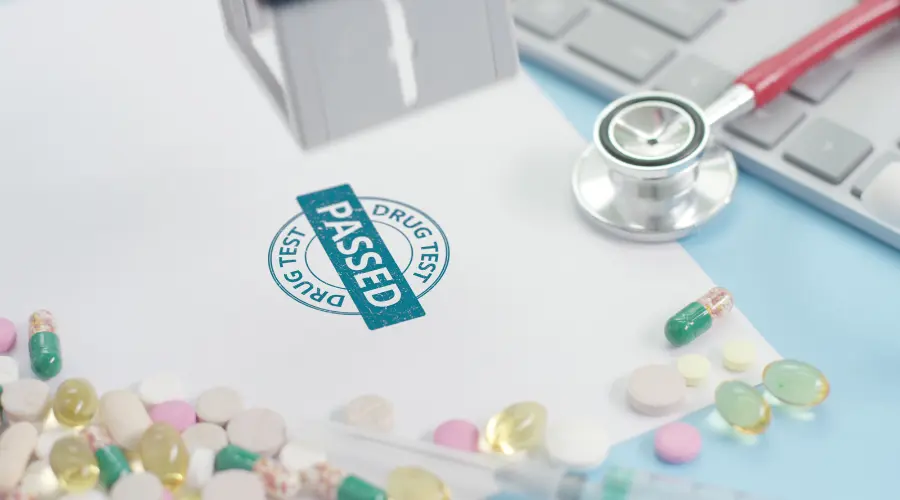Get Answers on a Crucial Topic and a Path Back to the Workplace
You may already know that when you work as an airplane pilot, commercial truck driver, bus driver, or in other safety-sensitive jobs regulated by the Department of Transportation, using drugs or alcohol before being tested can have severe consequences.
In these sorts of roles, any type of drinking or drug use has the potential to put your employment at risk and trigger the requirement of a return-to-duty drug test.
This likely leaves you wondering what happens if you fail a return to duty drug test and if that is the last straw before your employer terminates you for good.
The good news is that failing a return-to-duty drug test does not guarantee termination, but it does prolong how long you’ll be out of work in most cases and mean you will need to be cleared to return to duty once again.
Keep reading to have your questions about the return-to-duty process answered and learn how South Shores Detox can support you through your recovery journey.
What is a Return-to-Duty Drug Test?
A return-to-duty (RTD) drug test is the last step before returning to work after you test positive on a drug or alcohol test administered by your employer.
Before coming back, you’ll need to meet certain stipulations like seeking substance abuse treatment and passing drug and alcohol testing.
When is Return-to-Duty Drug Testing Required?
Passing a drug test is required at the end of the return-to-duty process. It is most commonly required for individuals in safety-sensitive positions including subway officers, emergency personnel, commercial truck drivers, and ship captains.
In most cases, if you have to go through the return-to-duty process, you have already refused or failed drug testing. Your employer may have suspected substance abuse and issued a DOT drug test or there may have been an on-the-job incident.
It’s also common for employers to issue random tests, especially for CDL drivers, pilots, and others in related fields.
RTD drug testing may also be required if you refuse to submit to random testing while working in a safety-sensitive position, even without a positive drug test. An employer can also require return-to-duty DOT drug tests if you violate the company’s drug and alcohol policies.
What Happens if You Fail Return-to-Duty Testing?
After failing this type of drug test, you’ll need to begin the return-to-duty process from step 1.
This includes continuing to be removed from your position, completing another substance abuse professional (SAP) evaluation, seeking and completing treatment, reporting to a designated employer representative, and completing follow-up drug testing.
Can I Be Fired for Drug or Alcohol Addiction?
Drug and alcohol testing is one of the last steps of the hiring process. If you fail a pre-employment drug test, a company likely will not hire you. Once you are hired, however, there are certain protections for people struggling with diagnosed substance use disorder.
Under the Americans with Disabilities Act, employers cannot discriminate against employees who have past drug or alcohol addiction problems. They cannot use this information to avoid hiring you, especially if you’ve successfully completed a pre-employment test and drug screening.
Companies also cannot discriminate against employees for being in treatment either, especially if they pass drug testing.
However, it’s also important to remember that while there are protections in place, employers are protected too. Performing a random drug test with or without reasonable suspicion of drug use does not violate ADA civil protections.
It is also not illegal for employers to fire someone based on poor work performance, violating any drug or alcohol policy, or being under the influence at work.
The Return-to-Duty Process
Drug and alcohol addiction can have severe consequences for employment, especially when you perform safety-sensitive functions at work.
Fortunately, employers are sometimes willing to work with you, offering a second chance to those struggling with addiction. This is when the process to return to duty and resume safety-sensitive functions begins.
Before returning to work, you’ll need to meet guidelines like enrolling in a treatment program, submitting to regular and random drug tests, adhering to your company’s drug and alcohol policies, and passing follow-up drug and alcohol tests. Here’s a look at the RTD process.
Removal from Duty
Often, a failed drug test starts with immediate removal from duty. A Medical Review Officer confirms the failed test and you may be suspended with or without pay. On the domestic front, you may face custody issues if you fail a drug drug test and your family is living apart.
When a CDL driver fails, the alcohol or drug violation is also reported to the Federal Motor Carrier Safety Administration. You’ll often need to complete follow-up drug tests even after your return to work. Depending on the situation, CDL drivers can lose commercial driving privileges.
Evaluation by a Substance Abuse Professional (SAP)
After a positive test result, you’ll need to be evaluated by a substance abuse professional (SAP). This initial evaluation helps determine the extent of drug and alcohol use, the best course of treatment, and a timeline for returning to safety-sensitive duties.
For truck drivers and others with a Commercial Driver’s License, substance abuse professionals must meet Department of Transportation (DOT) regulations. It is your employer’s responsibility to provide a list of DOT-qualified substance abuse professionals.
During this face-to-face evaluation, you’ll be asked questions about personal and family history, stresses in your life, and history of drug and alcohol use. It’s important to remember that the questions asked by the substance abuse professional are designed to help them determine the level of support you need to overcome drug or alcohol addiction.
Answer honestly – these questions are not designed to get you in more trouble with work. Instead, they give insight into the type of treatment that will be helpful as you complete the return-to-duty process.
Seeking and Completing Treatment
After evaluation, an education and treatment program is recommended. The type and length of treatment might be recommended before an employee can return to work. It’s not uncommon for ongoing counseling to be recommended, even after you return to duty.
You’ll also have a follow-up evaluation with the same substance abuse professional once you’ve completed drug and alcohol education and rehabilitation. They’ll aid in implementing a follow-up testing plan before you move to the next step of the return-to-duty process.
Reporting
After successful completion of treatment and being cleared for work, the substance abuse professional you are working with will communicate progress with your employer.
They’ll also recommend the frequency of follow-up tests for drug or alcohol use after you return to work. Testing positive after returning could mean repeating the entire process or facing termination.
Passing the RTD Test
The final step in the return-to-duty process is passing return-to-duty tests. Some companies allow you to return to work after passing this initial test.
You must be directly observed for a return-to-duty test. Direct observation prevents people from trying to use fake urine or anything else to pass the test.
According to these direct observation rules, you’ll be accompanied by a member of the same sex who will watch you collect the sample for the return-to-duty drug test.
They may check for prosthetics and other devices that might be used to cheat.
Even after returning to work, you may have follow-up tests to ensure you are sticking to your treatment plan. It’s also normal to be included in the regular random testing pool. These random drug tests do not replace the follow-up test schedule – you’ll need to complete both.
Lastly, be sure to keep any documentation regarding your completed treatment program, follow-up tests, and any other parts of the return-to-duty process for up to five years.
This documentation on follow-up testing can be used in your favor if your employer were to have reasonable suspicion of an additional alcohol or drug evaluation. It will not supersede a positive result on a random test, however, so be sure to stay clean as well.
Start on a Reliable Road to Recovery at South Shores Detox
When you’re struggling with substance abuse, the education and treatment program you choose matters. Getting clean is important, but you also need to learn skills and better lifestyle habits that support long-term sobriety.
You’ll find all this and more at beautiful South Shores Detox, an accredited facility with a holistic approach to healing that sits right on the beach.
For reliable, professional help, reach out to the Shores today. We offer detox and a full range of treatment services to manage withdrawal comfortably and help you pass DOT drug testing.
All calls are completely confidential, so please reach out now for our support.




